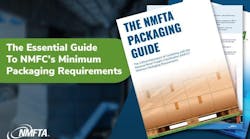MANAGER: Ed Boes
TITLE: Terminal manager
FLEET: D&D Sexton Inc., Carthage, MO
OPERATION: Refrigerated carrier operating 130 tractors and 290 trailers.
PROBLEM:
It should come as no surprise to anyone in the industry that trucking companies keep trying to find ways to lighten their environmental footprint. From efforts to reduce unnecessary engine idling and improve fuel economy to retreading tires and recycling shop waste where possible, carriers large and small are trying to do their part to be greener in their day-to-day operations.
Yet Ed Boes, terminal manager for refrigerated carrier D&D Sexton, knows such efforts can be difficult for fleets to undertake, for trucking companies must also focus on that other “green” known as money. Efforts to improve the environmental profile can't damage the bottom line or compromise operational efficiencies of the fleet.
Boes, a veteran fleet manager with 30 years under his belt, points to the use of what's known as “re-refined engine oil” as an example.
“We've talked about using re-refined motor oil for some time, mainly for what it could do for us as a company in terms of reducing our petroleum consumption,” he explains. Using re-refined engine oil instead of virgin product “means that for the average 12-gal. diesel engine change, we'd save America from importing 24 barrels of foreign oil,” Boes says. “That really appealed to us.”
SOLUTION:
Boes is responsible for managing a fleet of 130 tractors, now largely made up of 2010-model Freightliner Cascadia tractors equipped with Detroit Diesel DD15 engines, along with 290 refrigerated trailers equipped with Thermo King reefer units. So any re-refined engine oil would have to serve double duty, lubricating D&D's truck engines as well as its reefer motors.
A rep for Universal Lubricants, a supplier Boes had used previously, asked him to consider its new Eco Ultra 15W-40 re-refined oil for just such a multi-use purpose. The company operates 28 facilities in 14 states, including a super re-refinery in Wichita, KS. Using what it calls a “tightly controlled closed-loop process,” Universal collects used oil and puts it through a hydrotreating process at its refinery to remove all the water, fuel and solvents as well as metals, asphalt flux and other contaminants. That now “purified high-quality Grade II base stock” oil is then blended with high-performance additives into re-refined engine oil that meets API and SAE requirements plus current engine OEM specifications.
Boes, who has managed D&D's fleet for 21 years, wanted to ensure Eco Ultra would hold up during the daily pounding of trucking operations. First, he made sure the oil met the CJ-4 truck engine standard (which it did) and got Detroit Diesel approval for use in its engines. Next, he pilot-tested it for a year, measuring its performance via his fleet's oil sampling program, which is provided by Universal.
“We needed a long period of time so we could completely flush out all of the previous engine oil we used and replace it with Eco Ultra to get an accurate reading on its performance,” he explains.
Not only did the re-refined engine oil hold up, Boes says he's able to extend his fleet's truck engine drain intervals with it from 25,000 mi. out to between 35,000 to 40,000 mi. with the potential to go out as far as 50,000 mi. “It also costs no more or any less than crude-refined engine oil as well, so it didn't affect the bottom line,” he adds. It also performed successfully in D&D's Thermo King units.
Altogether, for D&D's fleet, the use of re-refined engine oil translates into 4,080 barrels of oil saved per drain interval. “I've seen a lot of green widgets and gadgets come and go during my career in trucking, so you've got to do your research to make sure they prove out,” Boes says. “This did — and that's why I think this is right for us to do.”


